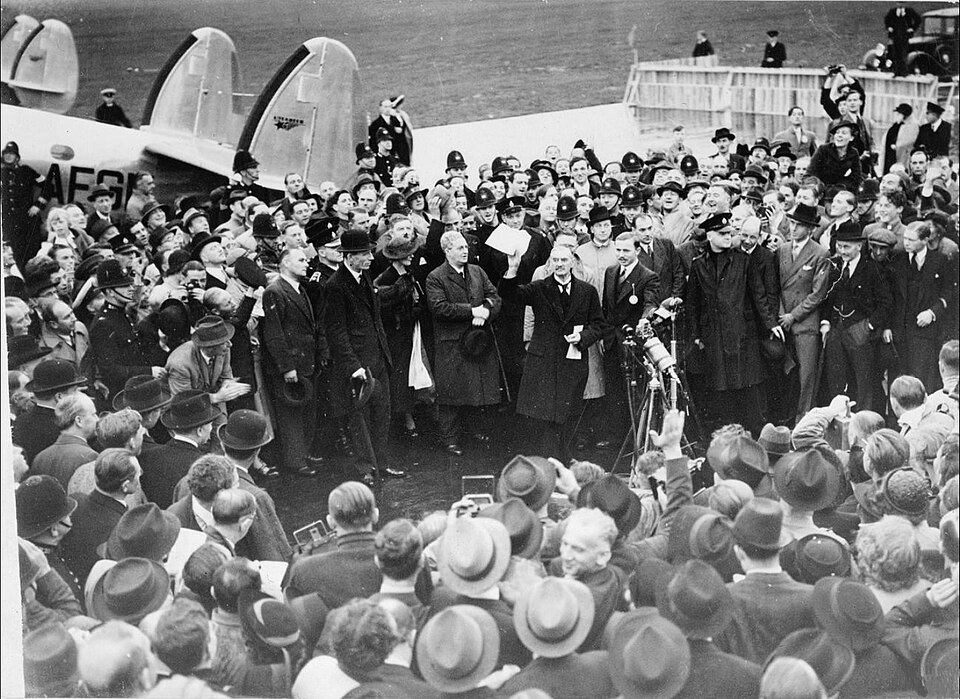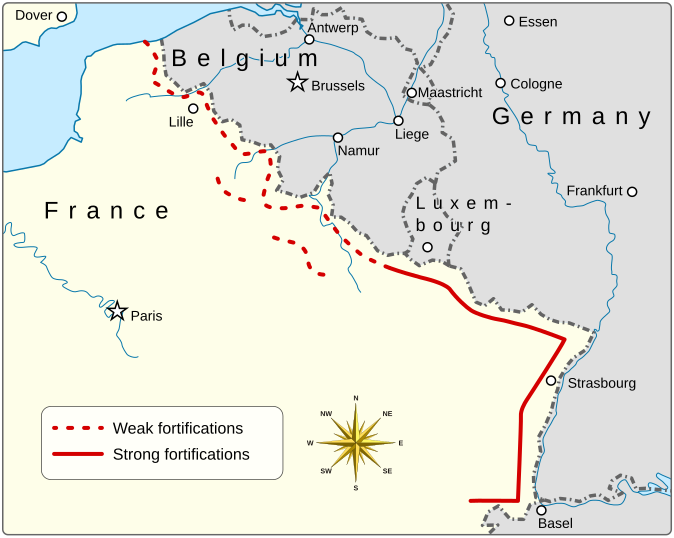IB Syllabus focus:
'Varied international responses to early German expansion (1933–1938).
The role of major powers and international bodies in addressing or appeasing aggression.
The shift in international policy and alliances as war became imminent.'
Between 1933 and 1938, Germany, under the leadership of Adolf Hitler, pursued aggressive expansionist policies. The international community's reactions to this aggression varied widely, ranging from appeasement to growing alarm, fundamentally altering the landscape of global politics. For more context on Hitler's policies during this period, refer to Hitler's Germany 1933-1939.
Varied International Responses to Early German Expansion (1933–1938)
Appeasement:
Rationale: The traumas of World War I lingered in European consciousness. Many believed that avoiding another large-scale conflict was paramount, even if it meant compromising on some principles.
British Perspective: Prime Minister Neville Chamberlain believed in addressing some of Germany's grievances to maintain peace. He argued that certain provisions of the Treaty of Versailles were too harsh and needed revision.
Munich Agreement: In 1938, Britain and France permitted Germany to annex the Sudetenland region of Czechoslovakia in return for a promise of no further territorial expansion. This epitomised the appeasement policy. For additional context on international responses, see the Abyssinian Crisis and the League of Nations Response.

British Prime Minister Neville Chamberlain displays the paper from Munich on 30 September 1938, symbolising the hope that conceding the Sudetenland would preserve peace. The photograph captures the domestic and diplomatic confidence underpinning appeasement at its high-water mark. Source
Economic Relations:
International trade continued with Germany, and some nations actively pursued stronger economic ties, either to bolster their own economies or in the hope of moderating German ambitions.
Anglo-German Naval Agreement (1935): This accord allowed Germany to maintain a navy up to 35% of the size of the British navy, undermining Versailles' provisions.
Soviet Union’s Stance:
Distrust and Tentative Overtures: The USSR was wary of Germany's ambitions but was also concerned about potential encirclement. They sought agreements with France and Britain but felt that their concerns weren't adequately addressed.
Stalin's Diplomacy: Stalin, viewing the West's appeasement policy with suspicion, began to consider alternative diplomatic options, fearing isolation in a conflict against Germany.
Role of Major Powers and International Bodies in Addressing Aggression
Britain:
Defensive Preparations: Alongside appeasement, Britain discreetly intensified its rearmament programme. The Royal Air Force expanded, and Britain's naval capabilities received significant investment.
Public Opinion: The British public, haunted by memories of WWI, initially supported appeasement. However, as German aggression persisted, a shift towards a more confrontational stance emerged.
France:
The Maginot Line: France heavily invested in this line of fortifications along its border with Germany. However, its defensive focus made proactive action against Germany difficult.

Map of the Maginot Line along France’s eastern frontier, indicating principal fortified sectors and ouvrages. The diagram clarifies why French strategy skewed defensive in the mid- to late-1930s and how this shaped responses to German moves. Source
Alliance with Eastern Europe: France signed mutual assistance pacts with several Eastern European countries like Czechoslovakia and the USSR in an effort to form a counterbalance against German ambitions. To understand the background of German foreign policy, see Kaiser Wilhelm II and German Foreign Policy.
League of Nations:
Created to prevent conflicts, the League was hampered by its lack of enforcement power and the absence of the US as a member.
Ineffectual Sanctions: The League did impose sanctions on aggressor nations but lacked the clout to enforce meaningful penalties. Germany's departure from the League in 1933 further weakened its influence.
Shift in International Policy and Alliances as War Approached
End of Appeasement:
The annexation of the rest of Czechoslovakia in 1939, after the Munich Agreement, starkly highlighted the failure of appeasement. This act directly contradicted German assurances and signalled to Britain and France that Hitler could not be trusted. The rise of aggressive policies in other countries can be studied in Japanese Nationalism and Militarism.
Guarantee to Poland: Britain, alongside France, guaranteed military support to Poland if it faced aggression, marking a definitive end to appeasement.
The US Perspective:
Isolationism: The US initially maintained a stance of isolationism, focusing on domestic issues after the hardships of the Great Depression.
However, President Roosevelt grew increasingly wary of the Axis powers. While not yet involved, the US started aiding potential allies through programmes like the "Lend-Lease" scheme.
Axis Powers Formation:
Germany's alliances with Italy, after the Rome-Berlin Axis declaration in 1936, and later with Japan in 1939, solidified the Axis Powers' alignment, posing a significant global threat.
Nazi-Soviet Pact:
In 1939, the world was shocked when Germany and the USSR, seemingly ideological enemies, announced the Nazi-Soviet Non-Aggression Pact.
This pact had a secret protocol dividing Eastern Europe into spheres of influence. The pact ensured that when Germany invaded Poland, the USSR would not interfere, leading directly to World War II's onset.
By the end of the 1930s, the diplomatic landscape had undergone seismic shifts. While appeasement dominated the initial responses to German aggression, the world's major powers began to realign as the shadows of a new world war lengthened. For a broader understanding of European colonial policies, consider reviewing Nigeria: Direct and Indirect Rule.
FAQ
The Munich Agreement of 1938, which allowed Germany to annex the Sudetenland region of Czechoslovakia, was initially hailed as a diplomatic triumph, particularly by British Prime Minister Neville Chamberlain. The prevailing sentiment was that by addressing some of Germany's grievances related to the Treaty of Versailles, another large-scale conflict could be averted. Chamberlain famously returned from Munich declaring "peace for our time." The immediate rationale was rooted in the deep-seated fear of another world war and the belief that appeasing some of Hitler’s demands would satiate his expansionist appetite.
While no major nation openly endorsed Germany's aggressive actions, certain countries pursued policies or made decisions that indirectly facilitated or did not obstruct Germany's ambitions. Italy, for example, gradually aligned more with Germany as the 1930s progressed, culminating in the Rome-Berlin Axis. Italy's own expansionist ambitions in Africa and the Mediterranean region made cooperation with Germany strategically appealing. Similarly, the Soviet Union's decision to sign the Nazi-Soviet Non-Aggression Pact in 1939 was a clear indication of its willingness to tolerate German aggression in Eastern Europe, provided the USSR's own territorial interests were respected.
Germany's economic predicament in the early 1930s, exacerbated by the Great Depression, played a crucial role in shaping its aggressive foreign policies. The Nazi regime, upon coming to power, sought to restore national pride and improve the economy. Expansionist strategies provided opportunities for economic growth through the acquisition of resources and territories. Territorial annexations like the Rhineland and Sudetenland were not only politically motivated but also aimed at exploiting these regions' economic assets. Moreover, the aggressive stance provided employment through rearmament, appeasing domestic audiences by projecting an image of a resurgent and powerful Germany.
The decision to guarantee military support to Poland in 1939 marked a significant shift in British and French policies. The annexation of the entirety of Czechoslovakia by Germany, following the Munich Agreement, made it evident that appeasement was failing. This act blatantly contradicted Germany's previous assurances and indicated Hitler's broader territorial ambitions. In this context, the guarantee to Poland was both a defensive move to check further German expansion and a clear signal to Germany that Britain and France were prepared to take military action if Hitler continued his aggressive policies.
The US's policy of isolationism was rooted in its desire to avoid entanglements in European conflicts, especially after the trauma of World War I. Consequently, the US remained largely detached from the intricacies of European diplomacy during the 1930s. Their isolationism meant that they were not a counterbalance to German ambitions, indirectly allowing European powers like Britain and France to pursue appeasement without significant opposition or alternative strategies being presented by the US. However, as the decade progressed and the magnitude of the German threat became clearer, the US began to transition from strict isolationism, exemplified by acts like the "Lend-Lease" scheme which supported potential allies.
Practice Questions
The League of Nations, formed after World War I, was designed to maintain peace and resolve international disputes. However, its response to German aggression from 1933 to 1938 can be categorised as largely ineffective. One of its primary shortcomings was its lack of enforcement power. While it did impose sanctions on aggressive nations, it lacked the ability to enforce meaningful penalties. Additionally, Germany's decision to exit the League in 1933 considerably weakened its authority. The League's inability to deter German ambitions, combined with key nations prioritising appeasement, rendered it largely impotent in face of the growing threat.
The policy of appeasement, prominently pursued by Britain and to an extent France, was pivotal in shaping international relations in the 1930s. Aimed at preventing another catastrophic war, appeasement involved conceding to some of Germany's territorial and diplomatic demands. Examples include Britain's and France's acceptance of Germany's annexation of the Sudetenland through the Munich Agreement. However, this policy, rather than ensuring peace, emboldened Hitler, leading him to further transgressions, such as the occupation of Czechoslovakia. Ultimately, appeasement failed to prevent conflict and is seen by many historians as having inadvertently encouraged German aggression, hastening the onset of World War II.

